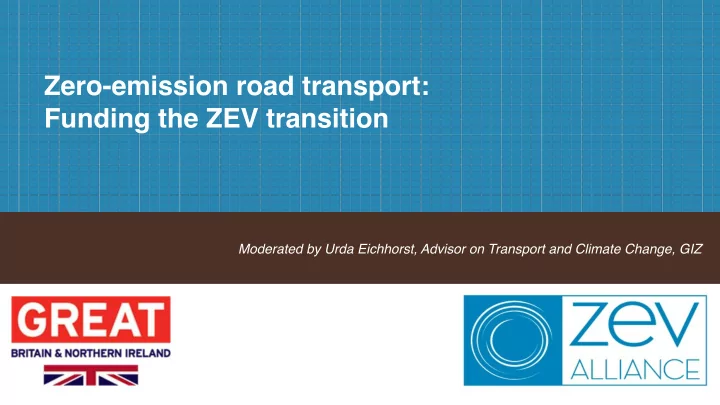

Zero-emission road transport: Funding the ZEV transition Moderated by Urda Eichhorst, Advisor on Transport and Climate Change, GIZ
ZEV Alliance: Peer-to-Peer Collaboration § Monthly collaboration of 18-government ZEV Alliance member network § Collaborate, share info, experiences on policy and market developments § Support each other on action plans, incentives, utility policy, campaigns, infrastructure § Email exchange: 75 individuals from ZEV Alliance governments § Monthly teleconference representation: 25+ staff from 18 governments § In-person meetings 2015-2019: § Oakland, New York, Montréal, Amsterdam, Stuttgart, Bonn, London, New York 2 ZEV Alliance events: http://www.zevalliance.org/all-events/ ZEV Alliance reports: http://www.zevalliance.org/publications/
ZEV Alliance: Focus areas for deep collaboration Three 2020 focus areas to be announced! Expanding access to ZEVs Implementing open, smart charging Funding the full transition to ZEVs Accelerating ZEVs in shared fleets Fast charging best practices Electrifying non-road transport Hydrogen infrastructure practices Charging infrastructure practices Zero-emission heavy-duty vehicles Consumer outreach best practices Utility ZEV best practices Evolution of incentives Next-generation ZEV technology Principles for incentive design ZEV role in climate mitigation Collaborative agenda Oakland Madrid New York Montréal Amsterdam Portland Paris COP21 Stuttgart Bonn COP23 London California Katowice New York Meeting COP25 event Launch Assembly Assembly Assembly Announcement Roundtable ZEV event Assembly Summit COP24 event Assembly 2015 2016 2017 2018 2019 2020 3 ZEV Alliance events: http://www.zevalliance.org/all-events/ ZEV Alliance reports: http://www.zevalliance.org/publications/
Funding the ZEV transition research objectives § How are governments funding ZEV support programs now? § Vehicles, infrastructure, consumer awareness, R&D § How can governments design sustainable, long-term funding sources? § Polluter-pay principles, carbon markets, bonus-malus taxes § What are key low-outlay policies for long-term support? § Emissions regulations, ZEV mandates, green building codes, low emission zones § How does total investment compare with long-term benefits? 4
Costs, benefits, and policy in the U.S. through 2050 § By 2050: Cumulative benefits are 10x the cumulative costs, annual benefits over $250 billion Incentives Pollution-indexed fees and taxes for all vehicles for road maintenance, infrastructure Standard industry marketing for ZEVs Consumer campaigns Market-led public infrastructure rollout Infrastructure support Vehicle standards (CO 2 and ZEV regulations) $250 Upfront incremental cost Net present value (billion 2018 $) Public charging $200 Home charging Awareness $150 Federal income tax credit State purchase rebates $100 Upfront reduced price Energy savings $50 Maintenance GHG mitigation $0 Net benefits -$50 2020 2025 2030 2035 2040 2045 2050 5 Source: Slowik, Hall, Lutsey, Nicholas, & Wappelhorst (2019): http://www.zevalliance.org/funding-zev-transition/
Perspectives from ZEV Alliance leaders Moderator: Urda Eichhorst, Advisor on Transport and Climate Change, GIZ Benoit Charette , Minister of the Environment and the Fight Against Climate Change Québec, Canada Jared Blumenfeld , Secretary for Environmental Protection California, United States George Heyman , Hon. Minister of Environment and Climate Change Strategy British Columbia, Canada Mariette van Empel , Director of Sustainable Mobility, Ministry of Infrastructure and Water Management The Netherlands Aaron Berry , Deputy Head of the Office for Low Emission Vehicles, Department for Transport United Kingdom 6
Resources For more information about the ZEV Alliance, please visit www.zevalliance.org For questions, please email secretariat@zevalliance.org Download the full report on Funding the ZEV transition at: www.zevalliance.org/funding-ZEV-transition Acknowledgements This work is conducted for the International Zero-Emission Vehicle Alliance and is supported by its members (Baden-Württemberg, British Columbia, California, Canada, Connecticut, Germany, Maryland, Massachusetts, the Netherlands, New Jersey, New York, Norway, Oregon, Québec, Rhode Island, the United Kingdom, and Vermont) and the ClimateWorks Foundation 7
Recommend
More recommend